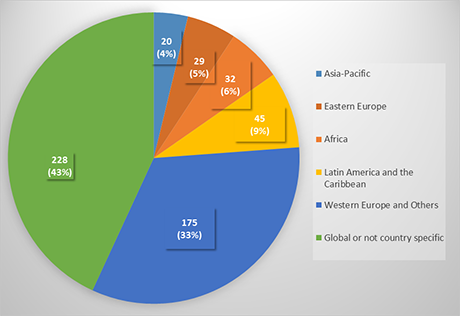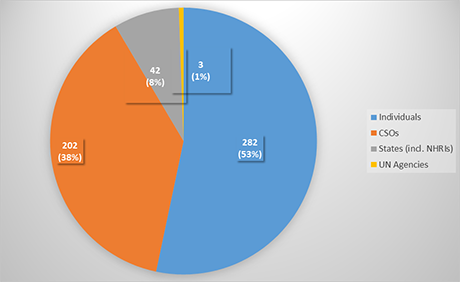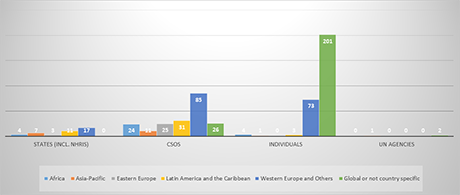Report on Gender Theory
Issued by
Independent Expert on sexual orientation and gender identity
Published
01 June 2021
Issued by
Independent Expert on sexual orientation and gender identity
Published
01 June 2021
Issued by Special Procedures
Subjects
Special Procedures, Sexual orientation and gender identity
Symbol Number
A/HRC/47/27
Summary
The present report is submitted to the Human Rights Council pursuant to Council resolutions 32/2 and 41/18. The Independent Expert on protection against violence and discrimination based on sexual orientation and gender identity, Victor Madrigal-Borloz, analyses the current state of international human rights law in relation to the recognition of gender and gender identity and expression, in connection with the struggle against violence and discrimination in its different forms.
Reader-friendly summary
English:
Issued by Special Procedures
Subjects
Discrimination, Sexual orientation and gender identity
Symbol Number
A/76/152
Summary
The Independent Expert on protection against violence and discrimination based on sexual orientation and gender identity, Victor Madrigal-Borloz, analyses backlash against the incorporation of gender frameworks in international human rights law. The present report complements his report entitled “The law of inclusion” submitted to the Human Rights Council at its forty-seventh session.
Gender theory informed approaches recognize that the meanings attached to sex (and other) differences in relation to social roles, behaviours and expectations are socially created. They also challenge the assumption that gender identity necessarily correlates with biological sex and recognize the validity of a wide range of sexual orientations and gender identities. The recognition of gender as determined by social construct is common to many feminisms, as well as LGBT theory, as is the recognition that gender, sex and sexuality interconnect with other axes of power and identification such as race, age, ethnicity, religion, [dis]ability and health status among others. These approaches provide, for example, recognition of how race is gendered and gender is raced, as well as the many other factors which affect how one is allocated rights, privileges or deficits and limits to rights through social regulation.
Comprehensive and intersectional gender analysis has influenced the interpretation of international human rights law, and many States have adopted gender as a key concept in laws and policies aimed at protecting women and LGBT persons against violence and discrimination. Nevertheless, within multilateral and regional organisations, among other fora, there are currently narratives that, under different lines of characterization (including the accusation of so-called “gender ideology”), seek to eliminate the gender framework from international human rights law instruments and processes, and national legislative and policy documents. These attempts could impact progress achieved over the last four decades on gender equality and the recognition of sexual and gender-based violence and violence and discrimination based on sexual orientation and gender identity.
In addition, there has been a steep rise in the use of platforms by extremist political leaders and religious groups to promote bigotry, dehumanize persons based on their sexual orientation or gender identity, and foster stigma and intolerance among their constituencies. This trend is generated through orchestrated and well-resourced strategies that aim at negatively impacting the progressive recognition of human rights standards relating to gender equality and sexuality. The reports issued by the Independent Expert on protection against violence and discrimination based on sexual orientation and gender identity in 2021 address this issue from two complementary angles.
The first part, “The law of inclusion”, investigates how the concept of gender is enshrined in international human rights law and concludes that gender identity and expression are protected thereunder, and that gender-based approaches and intersectionality provide a sharp lens for analyzing the root causes of violence and discrimination based on sexual orientation and gender identity. They enable the analysis of multiple asymmetries of power, deriving from how sex is understood within society, including those that feed violence and discrimination against women in all their diversity.
The second part, “Practices of exclusion”, analyses backlash against the incorporation of gender frameworks in international human rights law. It concludes that exclusionary narratives and actions related to gender and gender identity exploit preconceptions, stigma and prejudice, creating risks for the rights of all women (including lesbian, bisexual and trans women) and contributing to the perpetuation of violence and discrimination based on sexual orientation and gender identity.
View easy-to-read summary of the report
PDF: English
This research process included a literature review, and a call for inputs, in response to which 529 submissions were received, including a total of 42 submissions from State entities stemming from all regions, and 484 contributions from non-State stakeholders, including 202 from organizations and 282 from individuals. The Independent Expert is humbled by this highly participative process: in total, he received specific information concerning 88 UN Member States, covering all geographic regions and a significant proportion of the populations, cultures, legal traditions and religions of the world.
Submissions are being processes for publication and qualifying submissions will be posted shortly
Number (and percentage) by region

Number (and percentage) by stakeholder type

Number by stakeholder type and by region

Andorra: note verbale | input
Angola: note verbale | input
Argentina: note verbale | input
Honduras: note verbale | input-2 | input-1
Mexico: note verbale | input
Spain: note verbale | input
Togo: note verbale | input
United Kingdom: cover letter | input
Uruguay: note verbale | input-1 | input-2 | input-3 | annex-1 | annex-2
Comisión de Derechos Humanos de la Ciudad de México: input | annex-1 | annex-2 | annex-3 | annex-4 | annex-5
Commission on Human Rights of the Philippines (CHRP)
Cyprus Commissioner for Administration and the Protection of Human Rights
Danish Institute for Human Rights
Egypt National Council for Human Rights
El Salvador Office of the Human Rights Ombudsman
Georgia Office of Public Defender
Guatemala Human Rights Ombudsman of Guatemala
New Zealand Human Rights Commission
Nicaragua Office of the Ombudsman for the Defense of Human Rights
UNESCO Health and Education Section
Action Canada for Sexual Health & Rights (Canada)
American College of Pediatricians - The best for Children
APQG, l’association pour une Approche Mesurée des Questionnements de Genre
Arlington Parent Coalition (USA): input-1 | input-2
Asociación de Trans y Trabajadorxs sexuale (Argentina)
Asociación Para Una Vida Mejor - Apuvimeh (Honduras)
Association Femmes d'Espoir Mali (Mali)
Association of Concerned Mothers (Nigeria)
Association Society and Values (Bulgaria): input-1 | input-2
Association Spektra et al (Montenegro, Sebia, Croatia)
Associazione Family Day (Cremona)
Associazione Family Day (Rome)
Associazione Family Day (Umbria)
At-sik-hata Nation of Yamassee
Canadian Women's Declaration and Edmonton Small Press Association
Catholic Bishops' Conference of Ethiopia (CBCE)
Catholic Legislators in the Kenyan Parliament
Central Committee of Bulgarian Parents
Centre for Civil and Political Rights (Eswatini, Malawi and Zimbabwe)
Child & Parental Rights Campaign (USA)
CHOICE for Youth and Sexuality
Christian Reformist Party (HRP) (Bulgaria)
Coalición Internacional para el Desarrollo: input-1 | input-2
COALICIÓN LGBTTTI Y DE TRABAJADORAS SEXUALES CON TRABAJO EN LA OEA
Colectivo Trans-formación (Guatemala)
Costa Rican Red Cross Youth program
CREA, IWRAW AP, Yale Global Health Justice Partnership
Crystal Clear Ministries International
Eastern European Coalition for LGBT+ Equality
ECPAT International (Thailand)
Ethics and Public Policy Center
Eurocentralasian Lesbian Community (ELC)
Evangelical Fellowship of Zambia
Faith & Future Association (Bulgaria)
Familias Diversas Asociación Civil (AFDA) (Argentina)
Family Forum Austria: input-1 | input-2
Family Watch International and the UN Family Rights Caucus
Federación de Mujeres Progresistas: input-1 | input-2
Feminist Legal Clinic Inc (Australia)
Foundation for African Cultural Heritage (FACH)
FRI - The Norwegian Organization on Gender and Sexual Diversity
Fundación Arcoíris por el respeto a la Diversidad Sexual
Fundación Mexicana para la Planeación Familiar, A.C.-MEXFAM (Mexico)
Fundación MUJER & MUJER (Ecuador)
Human Dignity Center (Hungary)
Human Rights and Family Policy Institute (Slovakia)
IGLYO: input-1 | input-2 | input-3
Instituto Autónomo de Occidente (Mexico)
International Organization for the Family et al
Kenya Christian Professionals Forum (KCPF)
La Confluencia Movimiento Feminista
Lesbianas Independientes Feministas Socialistas (LIFS)
Lezbejska i gej solidarna mreža (LGSM, Lesbian and gay solidarity network)
Movimiento Dignidad, de Pinar del Río
National Organization for Human Rights Trainers
No Es Terapia y Women's Link Worldwide
Observatorio de Libertad Religiosa en América Latina - OLIRE
Ordo Iuris Institute for Legal Culture (Poland)
Panhellenic Federation of Armed Forces Unions PFEARFU
Pentecostal Assemblies of Africa (PAOA)
Polish women's rights collective
Political Network for Values: input-1 | input-2
Political Research Associates (PRA)
Programa de Acción por la Igualdad e Inclusión Social (PAIIS)
Pro-Life Choice (Bulgaria): input-1 | input-2
Red de Litigantes LGBT de las Américas
Save the Children International (Thailand Office)
Seed of Life Pregnancy Resource Center
Sexual Rights initiative (SRI) and AWID
SHINE SA (Australia): input | annex-1 | annex-2 | annex-3 | annex-4 | annex-5 | annex-6 | annex-7
The Association of Reintegration of Crimea
The EATHAN Family: input-1 | input-2 | input-3 | input-4 | input-5 | input-6 | input-7 | input-8
The International Federation for Therapeutic and Counselling Choice (IFTCC)
The Project for Human Development (PHD) (Nigeria)
The Women’s Human Rights Campaign
Transatlantic Christian Council
Uimarishaji wa Familia Tanzania
Unity for family and children: input-1 | input-2
Women's Human Right's Campaign España
Women's Legal Centre et al (South Africa)
World Federation of the Deaf (WFD)
Florence Ashley: input-1 | input-2 | input-3 | input-4 | input-5 | input-6 | input-7 | input-8
The Institute for Research and Evaluation
Allan Darwin: input-1 | input-2
Chawinroj Terapachalaph: input-1 | input-2
Dr. Jane Dobson and Dr. David Chan (Canada)
Florence Humbert: input-1 | input-2
Judith A. Reisman: input-1 | input-2
Lisandra Orrace Guerra and Irina Caridad León Valladares
Manuel Antonio Velandia Mora: input-1 | input-2